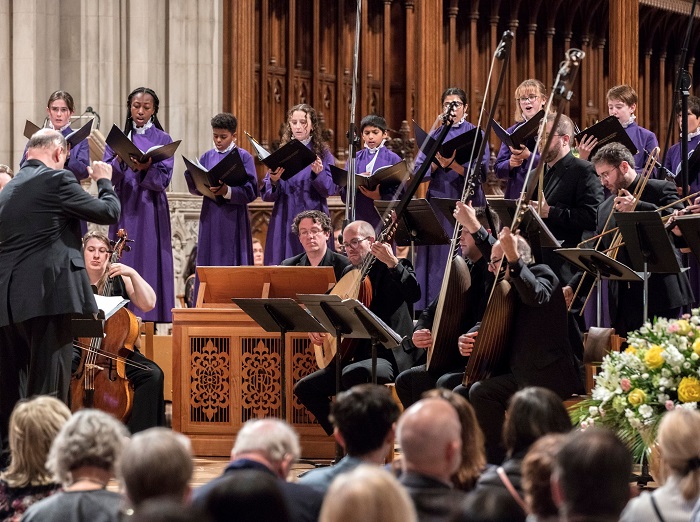Technically sublime, spiritually mixed “Vespers” at National Cathedral

Michael McCarthy led the Washington National Cathedral Choir in Monteverdi’s 1610 Vespers Sunday afternoon. Photo: Colin S. Johnson/Washington National Cathedral
Early music and houses of worship are an ubiquitous pair in the classical music world—an aesthetic, acoustic, and economic combination that often makes sense. Early music is not just a repertoire, but an endeavor, an attempt to recreate something of both the sound and experience of hearing music as it was centuries ago. Churches, many quite old, promise to make an early music performance a living tableau—history recreated in a space dedicated to the timeless and eternal.
But sometimes the two don’t quite mesh, especially—and maybe counterintuitively—when the music itself is liturgical. When Monteverdi wrote his Vespers of 1610, for example, it wasn’t concert music; it had the liturgical and social purpose of prayer before feasts dedicated to the Virgin.
It was heard in chapels during the composer’s lifetime, and on Sunday afternoon it was heard in the grand Washington National Cathedral, performed by the early music ensemble Cathedra and the Washington National Choristers, all conducted by Michael McCarthy, the cathedral’s music director. (Many also heard the concert by online livestream, including this reviewer.)
This was an excellent performance in many ways, with skillful, lovely singing and playing and a fine pace. That it also had an ambiguous feeling is a fault of circumstance: Early music is mainly a secular concert experience nowadays. Even inside a church, it takes place at an unavoidable distance from its founding context, arguably more so with early music written for worship.
The opening promised something beyond this. The orchestral fanfare and the “Domine ad adjuvandum” to start had great drive and energy, the orchestra pushing forward on the downbeats and bouncing off the dotted rhythms, and the vocal ensemble singing with a timbre that had a scintillating bite, the high voices light and luminous and the lower ones with an exciting, blunt edge. Something radical and vivid seemed to beckon here, performance with a pleasing roughness and a sense of expression and order that belonged to an earlier society, and even perhaps an imagining of what it might have been like to hear this music in Renaissance Mantua.
As things went on this edge dissipated—perhaps it was adrenalin wearing off—and the music-making settled into a highly accomplished, polished groove. The voices had an excellent blend while still expressing individual colors as each took a solo turn. Diction was consistently excellent, and tenors Ben Hawker and Jacob Perry were particularly impressive for their articulation of Monteverdi’s fast, and very difficult, vocal trills.
With singing at this level throughout, one was enchanted by the sound, but by the “Laudate pueri Dominum,” one felt any possible sense of mystery in the performance dissipating. It was not a case of excessive polish, or too much of a good thing; this was beautiful music-making. But the focus on a resonant vocal sound—though, again, quite lovely—had a way of sanding down the earlier roughness.
The “Pulchra es” duet was gorgeous, but without a sense of the mystical and exalted metaphor at its heart. Singing this technically superb can easily become only about itself, creating a certain sound and following the shape of a line—enjoyable but abstract pursuits. Sunday, this meant that the sheer sound of the playing—the feeling of the forward-moving harmonies and rhythms, the good spring in the faster music and the satisfying, full cadences with orchestra and chorus—was too clearly divorced from the meaning and purpose of the music even inside the cathedral.
The sense of possibility flickered in and out, however, with an effect that was both intriguing and frustrating. The two “Magnificats” that conclude the Vespers had some of the robust, earthy feeling that is at the core of Monteverdi, and one had the sensation that this was, as intended, music for every believer come to worship, not just for a ticket-buying audience. McCarthy’s guidance was assured throughout, and the flow, focus, and energy in what is a long piece of music (without intermission) never wavered. It was a beautiful afternoon, and if it wasn’t more than that, well, perhaps that’s all lost to time.
Cathedral Choral Society and Heritage Signature Chorale perform Hailstork’s Done Made My Vow, and other music by Black composers, 4 p.m. May 14. cathedralchoralsociety.org
